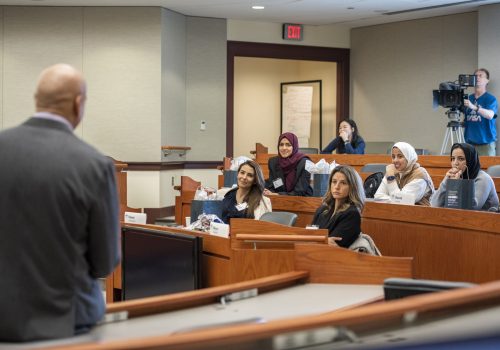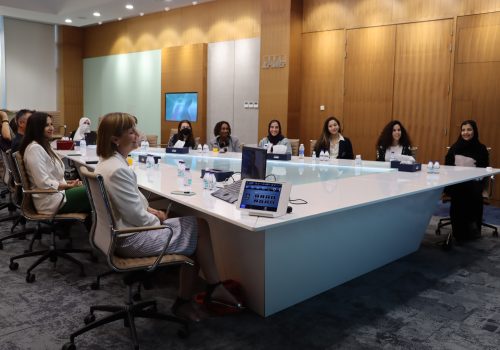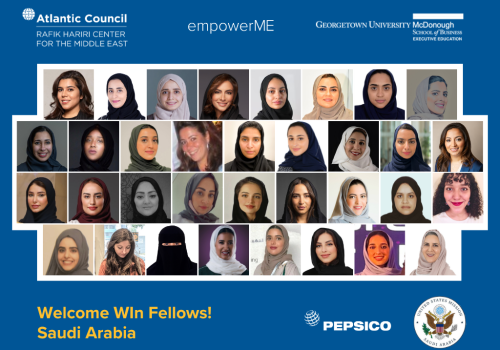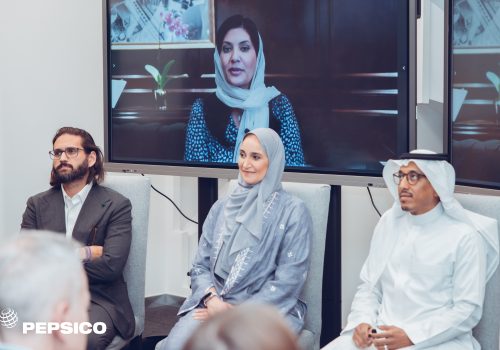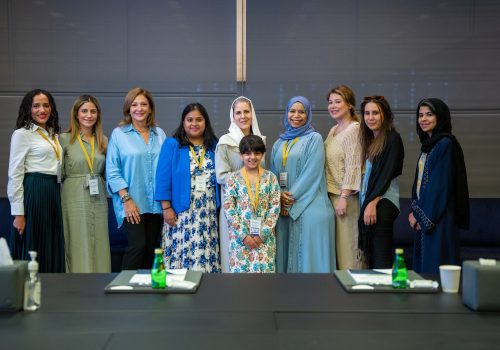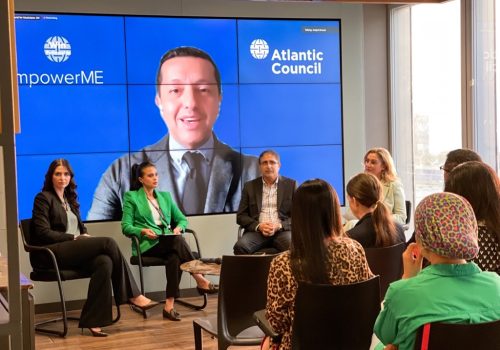Driving change: women shaping an inclusive financial future in UAE
On November 28th, the Atlantic Council’s empowerME Initiative, held a workshop titled “Women in finance: Building a more sustainable and inclusive finance system.” The panel focused on the contributions and impact of women in developing sustainable finance in the UAE.
The conversation was moderated by Abeer Abu Omar, government and economics reporter for Bloomberg. The panel included Shaikha Nasser Al Nowais, corporate vice president of owner relationship management at Rotana Hotel Management Corporation; Patricia Gomes, managing director and regional head of commercial banking for MENAT at HSBC; Linda Fitz-Alan, registrar and chief executive at Abu Dhabi Global Market Courts; and Thereshini Peter, chief financial officer for the GCC at Visa Inc.
Drawing upon their experiences as women working in finance, the panelists focused on the challenges to promoting greater representation in the sector as well as potential remedies. They identified common obstacles that hinder women from advancing in their careers, and suggested policy changes to promote inclusion and empowerment in the workplace. The speakers’ contributions provided an attainable vision for a more diverse and equitable financial sector.
The U.S. Ambassador to the UAE, Martina Strong, inaugurated the event with a reminder that economically empowered women invest in their families, communities, and businesses, leading to a more stable and prosperous future. She highlighted the growing visibility of women in leadership roles in regional start-ups and acknowledged the WIn Fellows in the audience for their accomplishments and future potential. The ambassador also expressed her enthusiasm for the climate-tech field, noting that many regional start-ups in the sector are run by women. She concluded her remarks by emphasizing the long-standing partnership between the United States and the United Arab Emirates.
Main Takeaways
Shaikha Nasser Al Nowais highlighted sustainability as a crucial element of the hospitality industry and a foundational principle of her company. She provided three examples of Rotana’s commitment: a new facility powered exclusively by solar power, sourcing foodstuffs from local farms, and a hotel designed with consideration for the natural landscape surrounding it.
Linda Fitz-Alan shared her perspective as a lawyer working in finance and emphasized that systems of power responsible for upholding the rule of law have a duty to model diversity and inclusion, especially regarding gender. Abeer Abu Omar concurred and cited a recent UAE law mandating that every listed company in the country appoint at least one woman to its board of directors. Thereshini Peter began by stating that without diversity and inclusion, a company can’t drive innovation, resilience, thought leadership, or economies of scale. She also discussed the programs and policies at Visa aimed at empowering its female staff, such as addressing the wage gap and facilitating the return of women to the office after taking a career break.
Omar noted that despite the UAE’s high gender equality ranking by the World Economic Forum, women still occupy less than 10 percent of board positions in the country. Al Nowais pointed to Rotana’s efforts to identify and attract talent by emphasizing work/life balance and providing ample opportunities for professional growth. She also underscored the importance of enabling women to advance within the company, highlighting the need for better long-term retention of female staff. Fitz-Alan highlighted other strategies such as expanding the range of roles available to women and finding mentorship and advocacy to support them. Sheaffirmed that women would seize opportunities when they are presented.
Gomes asserted that organizations often lack the discipline and conviction to implement known solutions to the problem. She pointed to policies at Bloomberg, such as requiring at least one woman as a source for an article and forbidding all-male media panels, as examples of conviction. Gomes stressed to the need for gender-diverse interview boards, sponsorship of female employees beyond mere mentorship, and encouraging women to apply for roles that they may feel unqualified for. She concluded by questioning why the consequences for a salesperson failing to meet their target are not the same for leaders failing to meet their gender diversity targets. Peter agreed with the other panelists, drawing a comparison to the dismantling of apartheid in South Africa. In order to enact major reform in a society or organization, deliberate action must be paired with accountability measures to ensure follow-through.
Al Nowais spoke on efforts to recruit a new generation of women to the workforce and addressed the initial challenges encountered in the recruitment of talent from universities. She highlighted the success of NAFIS, a government program offering salary support to Emiratis aiming to work in the private sector, thereby making corporate work more attractive and competitive.
Fitz-Alan addressedthe role of technology in addressing the challenge of visibility. She believesthatdigitization can help women overcome obstacles which have traditionally limited their visibility in the workplace. Technologies such as video chatting enable connectivity and global outreach for women to showcase their capabilities. Fitz-Alan pointed to the challenge of creating a highly diverse panel of mediators at her firm. Seeking the right candidates required an international search for more women, who often were not actively promoting themselves but were nevertheless making substantial contributions in their field.
Gomes agreed with Fitz-Alan’s view of technology as a positive force for gender diversity. She highlighted its transformative potential in reshaping the landscape for women’s participation and ensuring a level playing field. Technology offers flexibility, allowing individuals to work at their own pace, which Gomes sees as a great equalizer benefiting both women and men. She points to how Zoom equalizes opportunities in meetings by providing the same space and voice for everyone.
Moreover, Gomes noted the role technology plays in addressing financial literacy. She mentioned the ‘Noor’ app launched in HSBC’s wealth business, designed to provide financial education to females. Gomes considers this initiative imperative, especially considering the increasing financial decision-making role of women in the UAE across generations.
Peter outlined three key obstacles faced by small and micro-businesses. First, adopting new technology can present significant challenges, particularly in terms of quickly accessing new platforms. The solution lies in SMEs digitalizing as rapidly as possible to keep pace. Second, there is a need for financial inclusion and training for entrepreneurs, especially in an era of heighted cybersecurity. Lastly, green financing is essential, considering many entrepreneurs invest personal savings in their businesses.
The UAE’s Gender Balance Council reported a 70 percent female majority among university graduates, urging the financial sector to capitalize on this talent pool. Al Nowais emphasized the importance of early exposure to industry-specific knowledge through a relevant curriculum. She advocated for increased awareness and guidance from the outset of education. Fitz-Alan suggested widening opportunities across various sectors and holding organizations accountable for creating and publicizing career opportunities.
Gomes acknowledged the robust talent pipeline created by the 70 percent graduation rate and suggested a focus on graduate programs. Using HSBC as an example, she emphasized the global opportunities available and stressed the significance of execution in career development. Peter agreed with the emphasis on execution but stressed the need for flexibility. She claimed allowing graduates to explore different roles within the finance industry would help them discover their preferences, emphasizing the importance of adapting traditional approaches to foster career exploration
The Way Forward
The World Economic Forum’s 2023 Global Gender Gap Report ranked the UAE as the second-most gender-equal nation in the MENA region, topping the region in financial inclusion, women’s share of Parliament seats, and equal legal status. Government-led initiatives and policies, such as the mandate for at least one woman on publicly listed companies’ board of directors, have sought to transfer these gains into the workforce as well. However, a significant gender gap remains in the country’s private sector. Women comprised only about 18 percent of the total labor force, sidelining a considerable pool of untapped talent. In spite of the board of directors mandate, women still hold just 8.9 percent of board positions.
Realizing a more sustainable and inclusive financial sector in the UAE requires stronger measures by businesses to promote gender parity. These efforts must start with better recruitment practices to attract top talent, whether through proactive exposure to students and recent graduates or by leveraging government initiatives to ensure competitive pay. Equally as important is retaining women within companies and giving them the time, space, and support to grow into leaders. To that end, employers must recognize the need for better work/life balance for female employees, as well as offering substantial opportunities for coaching and mentorship. Companies must also take steps to protect women returning from maternity leave and eliminate the ‘motherhood penalty.’
Breaking through the glass ceiling will also require women in leadership to extend a hand to help others up behind them. Increasing female representation up to the C-suite level ensures that challenges faced by women in the workplace are addressed at a systemic level. Enacting policies such as an insuring female representation on interview panels is an excellent start, as is encouraging women to apply to positions from which they may discount themselves.
Explore the WIn Fellowship
Recommended content
Sponsors & in-country partner


empowerME
empowerME at the Atlantic Council’s Rafik Hariri Center for the Middle East is shaping solutions to empower entrepreneurs, women, and youth and building coalitions of public and private partnerships to drive regional economic integration, prosperity, and job creation.
